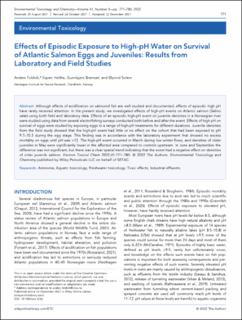Effects of episodic exposure to high-pH water on survival of Atlantic salmon eggs and juveniles: Results from laboratory and field Studies
Peer reviewed, Journal article
Published version

View/
Date
2022Metadata
Show full item recordCollections
- Publikasjoner fra CRIStin - NINA [2364]
- Scientific publications [1392]
Abstract
Although effects of acidification on salmonidfish are well studied and documented, effects of episodic high pHhave rarely received attention. In the present study, we investigated effects of high‐pH events on Atlantic salmon (Salmosalar) using bothfield and laboratory data. Effects of an episodic high‐pH event on juvenile densities in a Norwegian riverwere studied using data from several electrofishing surveys conducted both before and after the event. Effects of high pH onsurvival of eggs were studied by exposing eggs to a range of high‐pH treatments for different durations. Juvenile densitiesfrom thefield study showed that the high‐pH event had little or no effect on the cohort that had been exposed to pH9.7–10.3 during the egg stage. Thisfinding was in accordance with the laboratory experiment that showed no excessmortality on eggs until pH was>12. The high‐pH event occurred in March during low winterflows, and densities of olderjuveniles in May were significantly lower in the affected area compared to controls upstream. In June and September thedifference was not significant, but there was a clear spatial trend indicating that the event had a negative effect on densitiesof older juvenile salmon. Ammonia; Aquatic toxicology; Freshwater toxicology; Toxic effects; Industrial effluents Effects of episodic exposure to high-pH water on survival of Atlantic salmon eggs and juveniles: Results from laboratory and field Studies
